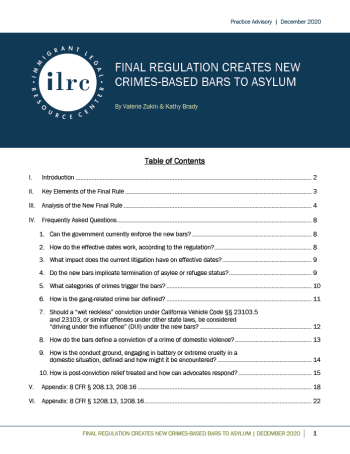
In October 2020, DHS and DOJ published a final regulation that sets out wide-ranging and draconian bars to applying for, and bases to terminate a grant of, asylum. For example, the bars include conviction of any felony, any controlled substance offense, a single DUI with injury, a DUI with a DUI prior (regardless of injury), and domestic violence bars based on the underlying conduct.
The regulation has been enjoined and is not in effect at this time. The litigation will continue into 2021. See Pangea Legal Services, et al v. U.S. Dep’t of Homeland Security, Case No. 3:20-cv-07721 and updates at https://nipnlg.org/our_lit/impact/2020_02Nov_lit-pangea-v-dhs.html. The effective date was to be November 20, 2020, and if the government prevails it still could be. There is good reason to think that the regulation will not be upheld, but criminal defenders should act conservatively and assume that it will. In cases where the person needs to be eligible for asylum, this may call for very aggressive defense. Counsel for post-conviction relief and immigration advocates also should carefully review the rule.
